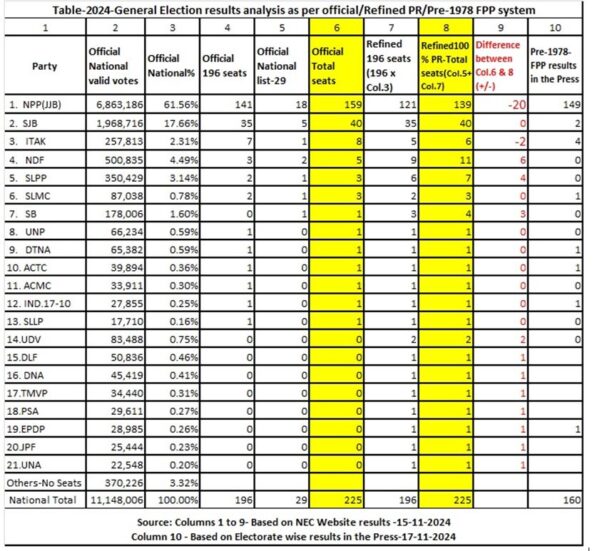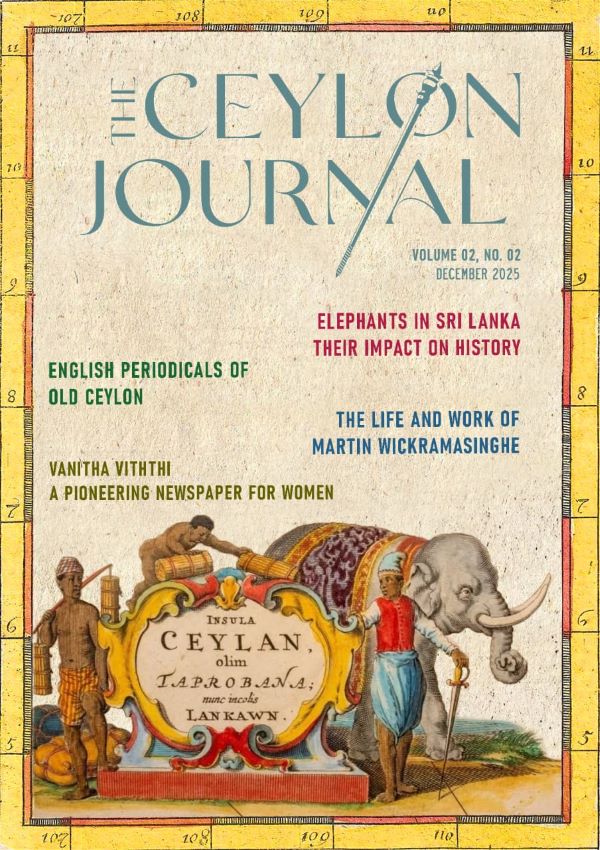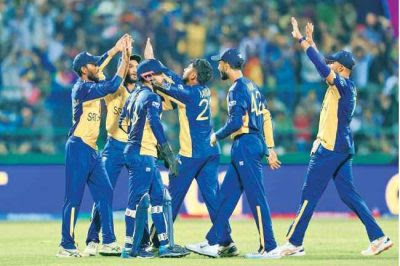Towards a robust ‘Representative Democracy’ via 100% Proportional Representation (PR) and ‘Country-first’ Nominations in merit order basis – By Bernard Fernando.

The original Proportional Representation (PR) system of 1978, is despised by sections of the general public and the academia, due to the notion created by its political critics that it was brought in to sustain the then Govt. in power which has since been proved wrong. In fact, by default, it aimed to abide by the tenet of recognizing maximum No. of valid votes for the allocation of seats among Parties, to greater and more equitable extent than the old Westminster style ‘First –Past the Post (FPP) system which relied on the saying ‘Winner takes it all‘. Despite PR being an arithmetical device, it received a double whammy when the critics leveled another unfair charge, when it’s optional adjunct viz. ‘Preference voting’ mechanism opened the doors to selfish, power hungry Party leaders, to select un-educated, black- moneyed village thugs to bolster their Vote banks.
Furthermore, the constitutional lawyers of the day , who were fond of using jargon and confusion, resorted to the use of complex terms such as ‘Qualifying Number’, ‘Relevant number of Votes’ and ‘Resulting number’/ ‘Constructive figure’ etc.as stated in Articles 98 and 99 of the Constitution, when they could have simply referred to the % of votes garnered by Parties in keeping with the term ‘Proportional Representation’, to ensure ‘Equal Ballot’, sought under Articles 93 of the 1978 Constitution and the more specific Article 21 (3) of UN’s ‘Universal Declaration of Human Rights -1948 harping on both equal suffrage and genuine elections. It surely drove the simple voters away from calculating the seat allocations and lowered the desired level of transparency of the Electoral process too.
TOWARDS A ‘ROBUST REPRESENTATIVE DEMOCRACY’ VIA 100% PROPORTIONAL REPRESENTATION (PR) BASIS
Presently, the summary of General Election results published by the National Election Commission (NEC) quite correctly indicates the National level % of valid votes obtained by contesting parties /Alliances. However, though the allocation of 29 National list seats complies with the official Party %, the allocation of 196 seats is not in proportion to the National vote % of parties due to the following undemocratic ‘tinkering’ to the original 1978 Constitution at the behest of power hungry, selfish politicians/Lawmakers harping on the need to have so called ‘Stable Govts.’ with big majorities.
i) Creation of 22 so called District ‘Bonus’ seats, at the rate of 01 to each District winner, ignoring the valid votes of all other parties in the respective Districts.
ii) Imposing District wise minimum requirement of votes (Since reduced from 12.5 % to 5%) discarding chunks of valid votes to the ‘Dust bin’ to favour Major Parties.
iii) Pre-determining allocation of seats to Parliament, based mainly on registered No. of voters at District level.
Ironically, recent history has shown that even a simple majority is not necessary, for the Govt.side, if the Bill tabled for final voting in the House is acceptable to both sides of the divide subject to amendments. The classic examples are the ‘Cake Walk’ passage of 17th, 19th and 21st amendments where some were approved by 224 votes ! The ‘DEAL’ factor can be eliminated with ‘Country first-Political Professionals in the Parliament.
The hitherto unseen differences resulting from the aforesaid ‘tinkering’ of the clean PR concept and the amusing outcome when the ‘Electorate level Press results are extrapolated to simulate Pre-1978 FPP Method’, can be seen from a simple Analysis of General Election results – 2024 as per TABLE below.

Notes 1. Highlighted columns 6 & 8 show the differences in Party seats arising between Existing PR (distorted by Bonus seats; 5% Dist. threshold & Pre-determined Dist. Seats) and 100% Refined PR.
2. Column 9 shows that, difference between Col. 6 & 8 require a re-distribution of 22 Seats among 13 Parties/Groups as stated below.
3.Column 10 – Based on Pre-1978 FPP reveals lop-sided results similar to 1970 &1977 elections.
4.The Table reveals that, if 100% PR arithmetic ensuring ‘equal value’ for votes was adopted at the 2024 election, the NPP would see a reduction from 159 to 139 seats which is below a 2/3rd majority. The ITAK would see a reduction from 08 to 06 seats. NDF sees an increase from 5 to 11 seats while SLPP would see an increase from 3 to 7. SB will increase their tally from 1 to 4. More importantly, 08 new Parties/Independent groups would enter the Parliament with UDV wining 2 seats as a new entrant while 7 other parties/ Groups enter with 01 seat each, giving maximum possible value to valid votes and creating a more inclusive and an equitable democratic mix in the Parliament.
Since the tinkered PR system became operative from 1989 General Election onwards, the readers can now rest assured from the above Table, that the system has not met the desired voter expectation on ‘equality of vote resulting in genuine proportionality in seat allocation’, nor the inclusive Representation of more No. of Parties. (Refer Column.7 of Table above) due to aforesaid tinkering of the Constitution.
It is pertinent to mention that the writer’s similar analysis for 2015 and 2020 General Elections were published in the press and submitted to the relevant authorities and civil Organisations without any positive response.
Thus, the writer wishes to repeat the simple solution, which is to allocate the 196 seats to the single Parliament, by simply multiplying the actual valid vote % of Parties at National level (Col.No.3 of above Table) by 196. Such allocated No. of Party seats at National level (Refer Column No.7) can be immediately re-allocated to Districts based on corresponding District Party Vote %.
TOWARDS A ROBUST ‘REPRESENTATIVE DEMOCRACY’ VIA ‘COUNTRY-FIRST’ NOMINATIONS ON MERIT ORDER BASIS
In 2018, the, complex MMV System resorting to appease FPP Camp using adhoc ratios was tested with the Island wide LG Election. As everyone knows , this alien MMV system with biased ratios, ended up with a jumble of ‘over hang’ problems and complexities climaxing in a dramatic, (nearly threefold) increase in the total number of local Govt. members to 8,653 and causing a remarkable delay in releasing the final results. Ultimately, it led to an indefinite postponement of PC elections too.
After 07 years, another unsuccessful LG Election was repeated in May 2025, under the same, fully politicized unproductive and complex MMV System, gobbling taxpayers’ money exceeding Rs. 10 Bln. The Politicians are still licking their wounds with the media rubbing salt on them using their daily news headlines and prime time news.Thus,the writing is on the wall that any further attempt to implement ‘MMV system’ would be an exercise in futility and absolutely redundant for voters and authorities in a small Country like Sri Lanka.
A UNIQUE AND RATIONAL METHOD TO ENSURE ‘COUNTRY FIRST’ MPS TO EACH ELECTORATE
The writer’s since refined, rational and simple method is outlined below to appease both FPP and PR camps with a ‘quality’ MP getting readily assigned to each of 160 electorates, and the balance 36 quality MPs to multi member electorates without compromising the precious ‘Equality of vote’.
- Repeal the complex ‘Mixed Member Voting (MMV) system and corrupt ‘Optional Preference voting’ mechanism.
- Elections for National Parliament and Provincial Councils (PC) to be held on ‘Clean Proportional Representation’(%) basis where the No. of seats will be allocated genuinely according to Party vote % s at National/District level.
- Geographical, ethnic and social variables etc. can be factored in, as usual in the compulsory ‘De-limitation exercises that would also strive to equalize the No. of Electoral districts with the No. of Administrative Districts without political bias.
- Submit Public cleared, Electorate level, ‘Country first’ nominee sub -lists in merit order compiled as ‘District lists’ for registration by Parties during Nomination period. (Proposed Standardised eligibility criteria and a structured interview scoring method to ensure required quality, gender and youth representation are prepared)
- Voters have to mark ‘X’ only for the party of their choice.
- Local Govt. (LG) election is proposed to be completely depoliticized and replaced by honest, acceptable and sociable independent nominees from ‘officially recognized ‘Jana Sabhas’ at Grama Niladhari Division (GND) level.
SPECIAL NOTE: 1. Writer’s 03 Part updated Essay with detailed methodology and benefits arising from 18 crucial ‘SYSTEM CHANGES’, carrying a Foreword from an erudite personality, can be forwarded initially in Sinhala and English languages as a free eBook-let on request, to improve voter literacy.
- Writer’s aforesaid ‘System changes’ and the procedure for ‘People based Constitution making’ have appeared in the press from time to time.
Main Benefits accruing from the above ‘System changes’
i. Our outdated and flawed ‘Representative Democracy’ will be transformed in to a ‘Robust Representative Democracy’ both in terms of seat allocation accuracy and Quality of representatives while ensuring reasonable gender and youth representation.
ii. Parties and voters will receive consideration for maximum No. of valid votes in a truly democratic and logical manner.
iii. All voters in North, South, West and East will own a ballot paper giving ‘equal value‘, untainted by Race, Religion or Caste and simply cast their vote only to the Party of their choice.
iv. Those supporting ‘First Past the Post (FPP)’ system will be delighted to have one or more quality MPs designated to their electorate without compromising the basic ‘equal value of vote through proportionality’.
v. The election process will be simple, fair, transparent, low cost, meaningful and productive for the Govt. and the Tax payers.
Concluding Note
The proposed ‘SYSTEM CHANGES’ mentioned above can be considered unique, simple and genuine when compared to the corrupt Preference Voting system and the complex MMV system which have created many issues including ‘Party inability’ to promptly select their nominees after the election is held as seen at the recently held Local Govt. Election and the Election Commission’s inability to prevent the possibility of exceeding the pre-determined No. of members to be elected.
Finally, for the sake of good order, it is felt pertinent to feed the readers with 06 more crucial ‘POLITICAL and ELECTORAL SYSTEM CHANGES’ as given below.
- Executive Presidency to be abolished with effect from a specific date, paving the way for the appointment of a hybrid ‘Non executive President’ with limited powers elected by MPs and Provincial Council Members, within the term of the current Executive President.
- Install a ‘Sustainable National Cabinet’ system to foster ‘Sri Lankan ness’ by allocating constitutionalised No.of portfolios to seat wining parties based on their National Vote % at a General Election. With the abolition of Executive Presidency, the portfolios to be allocated by consensus among Party leaders with the PM as the head of the Cabinet. This % method shall be applied to Provincial Councils (PCs) too.
- Objectively strengthen PCs with additional powers, (if necessary) to become more productive forging ‘Sri Lankan ness’ and rationalise the role and benefits of MPs accordingly.
- Brand the Party Election Manifesto’ as a prosecutable document with a monitorable, time- lined 5 year action plan subject to an Audit procedure, to make voters fully rely on it for a wise voting decision.
- Abolish corrupt ‘Cross over’ mockery and allow member vacancies to be filled by corresponding name/s from the relevant registered merit list.
- Rationalise registration of ‘Mushroom’/Unscrupulous/Decoy Political parties hiding behind Human rights, via stringent eligibility and high cash deposit requirements.
Since space doesn’t permit elaboration of benefits accruing from the above, the writer leaves the readers to draw the direct and indirect benefits accruing to the country and the people.
Accordingly, we can boast of a Country with clean Electoral and Political Systems which fully comply with the UN’s universal declaration of Human rights-1948’, where ‘Sri Lankans’ are its citizens enjoying a robust ‘Representative Democracy’.
Bernard Fernando
Former Deputy General Manager -BOC
Email: fernadobernard81@gmail.com




















